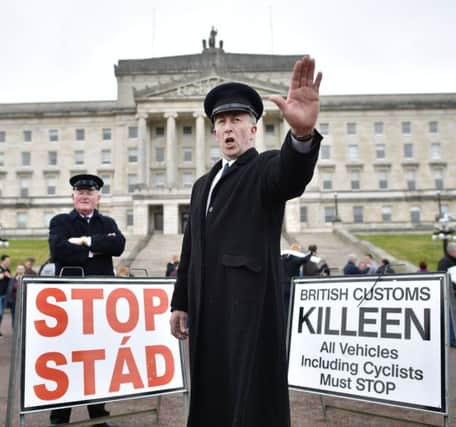Why the Irish border question is so important to Brexit


But it’s important to recall just how little the Irish border question was raised during the Brexit referendum.
With the focus on ‘taking back control’, immigration, and the notion that UK laws were being made in Brussels, the lead up to the vote saw many borders being discussed - just not the Irish.
Advertisement
Hide AdAdvertisement
Hide AdMore than a year later, and with negotiations between the European Union and the UK Government seemingly at an impasse, the issue is suddenly paramount.
How did one stretch of land became the focus for one of the most complicated negotiations in British and European history?
Practicalities
The most crucial physical characteristic, and one that is often overlooked, even by those on both sides of the negotiating table, is that the Irish border is not a recognisable border in the traditional sense.
Based on traditional county designations, the actual start and end points are difficult to accurately quantify.
For those on both sides of the border, it is barely a border at all, running through streets, communities, and villages.
There are several farms in the border area which quite literally straddle both countries, and a hard border for them would be a bureaucratic nightmare of unimagined proportions.
To give just one example of the fluid nature of the border, consider the A3 road, known as the N54 in the Republic, which crosses and recrosses the border four times in just six miles.
The two governments’ approach
The Conservative party, reliant on the support of the arch unionist DUP of Northern Ireland to stay in office, have urged for trade talks to get underway before the border issue is resolved.
Advertisement
Hide AdAdvertisement
Hide AdIreland’s government, for their part, have vowed to veto a deal (as all of the remaining 27 EU countries have power to do) that doesn’t adequately address a border that both governments insist must remain ‘frictionless’.
It appears that the UK Government feel they have a strong hand in this negotiations, and aim to capitalise on perceived domestic political instability in both Ireland and Germany.
Irish premier Leo Varadkar’s administration may have briefly flirted with disaster, but the resignation of his deputy has ended any fear of an immediate general election.
In any case, if Brexit Secretary David Davis thinks any changing of the guard in Dublin allows him more wriggle room, he would almost certainly be mistaken.
Fianna Fail, the main opposition party and only credible alternative party of Government, have arguably even more stringent demands over the border issue.
That ministerial sources briefed a pro-Brexit newspaper that a fear of ‘the political wing of the IRA’ was motivating Mr Varadkar’s stance suggests a fundamental misunderstanding of Ireland within the British government.
The Scottish angle
Perhaps Mr Davis and his colleagues are motivated by their erstwhile coalition partners in the DUP to take a hard stance on the Irish border negotiations.
As likely, is that they are motivated by the agitation of another party which stands in just one part of the UK – the SNP.
Advertisement
Hide AdAdvertisement
Hide AdWhile Nicola Sturgeon’s party, after some disappointing election results, have dropped their immediate plans for a Brexit-inspired second independence referendum, they can still throw spanners in the UK Government’s plans.
If Northern Ireland is given special status to ease the concerns of border communities, then the Scottish Government will almost certainly demand the same treatment.
The SNP’s position remains that Scotland should still be allowed to remain in the European single market, while the UK Government wants all of Britain’s constituent nations to operate on the same terms.
A change in status for Northern Ireland could give Nicola Sturgeon’s government the example they have been seeking to prove Scotland should be given special status.
With deadlines approaching from the EU, the Irish border remains one of the most urgent issues to be tackled by bother sides of the Brexit negotiations.
Worryingly for all concerned, it also remains one of the most complex.
